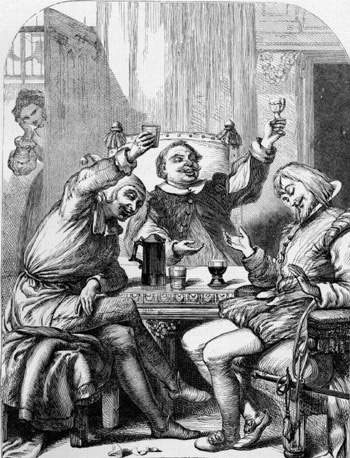Although I’ve been teaching for over 30 years, students continue to provide new insights into works that I thought I knew. Sophomore Wick Eisenberg did so recently with a Twelfth Night essay in which he examined an issue that has become a national concern: bullying.
Wick was upset at how Malvolio is treated—how he is humiliated and, especially, how he is shut up in a dark cell (a special phobia of Wick’s). In his first draft, Wick focused mostly on how unfair people are being to Malvolio. I suggested that a more interesting question—one that would move beyond mere matter of opinion—might be why characters choose to bully Malvolio in the first place—and what it is about Malvolio that lends itself to bullying.
We agreed that bullying often grows out of insecurity and that therefore something about Malvolio must be triggering the insecurities of Sir Toby, Maria, Fabian, and (although he’s hardly a leader in the plot) Sir Andrew. We decided that class insecurity is a major reason for the bullying.
Malvolio, a mere steward, dreams of rising about his station and marrying Olivia. Amongst his fantasies are lording it over Sir Toby. The reason that he can be hooked by Maria’s fake letter is because it tells him what he wants to hear.
So what would cause the confederates to be insecure about their class position, Wick wondered. Sir Toby, while Olivia’s uncle, is subordinate to her and depends on her indulgence. Fabian and Maria are fellow servants who probably have such dreams themselves—in fact, Maria succeeds in raising herself by the end of the play, pulling off a marriage with Sir Toby. Sir Andrew, the butt of other people’s jokes, appears in the classic role of the hanger-on, finding protection (so he thinks) by joining in the bullying of others. At one point he talks about beating Malvolio for being a Puritan.
Wick and I noted that one of the pranksters doesn’t appear insecure. If Feste the jester participates in the joke, it is not to feel better about himself but because his job is to undercut pretension and hypocrisy. He may go after Malvolio, but he also goes after Olivia and Orsino. (“Take away the lady,” he says at one point after proving the Olivia, not he, is the actual fool.) Therefore, when he feels that the joke against Malvolio has gone too far, he pulls out whereas Toby appears willing to destroy the man. Insecurity can go to such lengths.
Wick talked about Malvolio in terms of the Columbine killers, noting that one of the reasons they turned on their classmates was because of incessant bullying. Making that connection certainly gives an ominous turn to Malvolio’s final words. “I’ll be revenged on the pack of you,” he spits out as he stalks off.
It is a sour note to an ending that is otherwise joyous. Sometimes, to assure our own happiness, we think it necessary to render someone else miserable. Such is the psychological logic of bullying.
Go here to subscribe to the weekly newsletter summarizing the week’s posts. Your e-mail address will be kept confidential.


